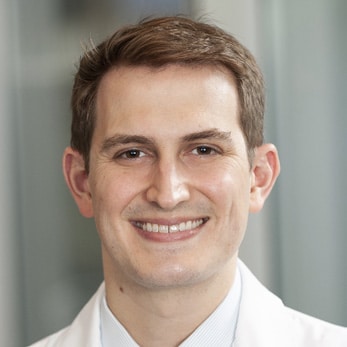Researcher Spotlight: David Qualls, MD
Memorial Sloan Kettering Cancer Center

Immunotherapies in lymphoma aim to activate the patient’s own immune system to help target and destroy lymphoma cells. While effective, the impact of these types of therapies is often hampered by changes to the immune system caused by the
lymphoma itself. Dr. Qualls’ LRF research therefore aims to improve the efficiency of immunotherapy in lymphoma by using a combination treatment approach, combining the use of a T-cell-activating drug with a bispecific antibody that helps facilitates interactions between T-cells, cancer cells, and other immune cells. “We believe that this combination will increase the ability of patients’ immune systems to kill lymphoma cells by several mechanisms,” he explains, “by increasing T-cell activation, and simultaneously broadening the immune response to include other types of cells in the immune system, which may prevent some of the mechanisms of resistance to immunotherapy seen in lymphoma.”
Dr. Qualls is currently serving as a clinical fellow in hematology and oncology at Memorial Sloan Kettering Cancer Center. His interest in lymphoma began early in his medical career, while he was a medical student at Washington University in St. Louis. One of the first patients he worked with there was an individual with immune thrombocytopenia (ITP), a condition in which his immune system destroyed his platelets and caused bleeding complications. His ITP was ultimately found to be caused by undiagnosed Hodgkin lymphoma, and by treating his cancer, they could improve his platelet counts as well. “Since then, I have been fascinated by the interactions between our immune system and lymphoma and have been driven to understand these interactions more thoroughly, and how we can leverage this understanding to improve patient outcomes,” Dr. Qualls explains.
In the future, Dr. Qualls hopes to establish himself as an independent clinical researcher focused on improving lymphoma treatment options. He is especially interested how current lymphoma therapies affect the immune system in both the short-and long-term, and what that means for future cancer treatment. Dr. Qualls is also very interested in engaging with patients to learn what matters most to them. “The patients I care for provide the fuel for my research,” he says. “Getting their perspective on the disease on a regular basis provides the fuel to ask why certain processes are happening and explore how we can develop more effective and less toxic therapies.”


